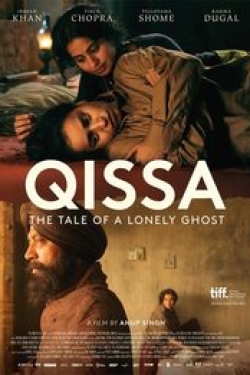-
About a ‘lonely’ ghost, the birth of a nation, and the corrosive power of love, superbly directed by Anup Singh. Top-notch peformances by Irrfan, Rasika Duggal and Tillotama Shome. This is a linear tale with multiple identities and diverse layers: something that explore all the variants of love, family, relationship and quite explores the corners of the heart. No Bollywood film has done it yet. But it's title alone makes it stand out of the queue: noticed the 2 titles? Actually, Anup Singh summarizes the story's subversive-ness and its dark undertones with its depiction of the emotional supernatural: someone who is a lonely ghost- or wait- a ghost who is a lonely traveller? Be it any, Tilottama Shome as the ghost here is a total finesse. She carves the account of this man who is stringed into the horrors of identity confusions in a way that is quite remarkable. Irrfan Khan as the aristocratic Umber Singh, is as always: a find, a new character. Divya Dutta ticks the boxes of a dramatic performance, and Rasika Dugal is a find. The film is beyond a fine film: the way it deconstructs its own horrors makes it a fantabulous watch.
I'm going with 4 out of 5.0September 22, 19 -
Qissa, an Indian-German film, directed by Anup Singh in Punjabi. It is a 2013 film, first released in Toronto International Film Festival - TIFF, followed by its release in Germany in July, 2014 and now in India in Punjabi Language. Perfect timing for the release of this movie, since it resonates with what India declared this year: Beti Bachao, Desh Bachao. Do we understand the gravity of this slogan? The movie portrays the obsession of many households, where people feel that the son is the saviour of the family, as if their slogan is “Beta Jano, Vansh Bachao / Vansh Badhao”. What a sad discrimination between genders. Today also, there are many households in our country, where the birth of a boy child is celebrated whereas a girl child is not welcomed. India’s rural as well as urban lives face with this non-acceptance of diversity. Education has definitely made lot of difference, still, many people still are trapped in the very same old thought that a son is required, son is the garur (pride) of the family whereas daughter is a liability. But, don’t they forget that they are violating the balance of the universe visualized by the creator. Even the biological fact is ignored that the very female is required to give birth to a child – whether a boy or a girl. This beautiful and intriguing plot is projected in Qissa (Qissa in Punjabi means ‘folk tale’ or ‘epic legend’. Qissa could have been a masterpiece with such a strong contemplative message, but somewhere, the theme ignored certain intricacies, adopts supernatural path to tell the story which creates some confusion in the minds of the viewers? Director also leaves certain vital information for the audience to infer and assume. The backdrop is the partition which happened soon after declaration of independence. Umber Singh (Irrfan Khan) is displaced from Pakistan and he has to migrate to Punjab in India. Amidst riots and violence, which emerged due to partition, Mehar (Tisca Chopra) gives birth to her third girl child. This scene is very painful, since on one side, lots of dead bodies are lying and on the other side, a baby is born. Umber doesn’t even want to see the face of the girl child, since he wanted a boy child. Umber moves to Punjab along with Mehar and three children. Though he lost everything due to migration, he works hard and resettles himself and family very well. Mehar is again pregnant for the fourth time. Umber strongly believes that they would be blessed with a baby boy this time. But to Umber’s despair, Mehar gives birth to their fourth girl child. Umber doesn’t accept the same and declares to himself and others that it is a baby boy. Mehar tells him- “Don’t do this to the baby”. But Umber is in no mood to accept it and ensures the upbringing of the child as a boy. ‘He’ grows up as Kanwar Singh, dresses as a boy, is trained for hunting, driving truck etc.But can Umber Singh challenge God’s creation? Can Umber defy biology? What happens when the female hormones start working?
3February 21, 15













